Why you should start a podcast now: Lessons from PMV 2020
Contents

This year’s Podcast movement virtual was full of informative talks and presentations. Whether you’re considering starting a podcast or already have a thriving show - there was something for everyone.
Over the 9 days, visitors could choose from any number of topics, including: How to make advertisers happy, Spotify for Podcasters, Reality Stars Podcasting and much much more.
And with so many talks to choose from it was difficult to know where to start. Thankfully, the event was punctuated with eight keynote presentations, packed with useful information.
So we’ve condensed the keynotes down into what we think are the three most important things you need to know about podcasting in 2020.
Read on to find out why it’s the perfect time to be a podcaster, why you should rethink your attitude towards competitors, and why it’s vital that you get familiar with your listeners.
Podcasting is on the rise
This is probably an obvious one - but the podcast industry is currently booming. As of April 2020, there are now one million podcasts out there and the number is only getting bigger.
And people are recognising this. Seth Godin, serial blogger and entrepreneur, dubbed podcasting ‘the new blogging’, and there are 500 million of those on the internet.
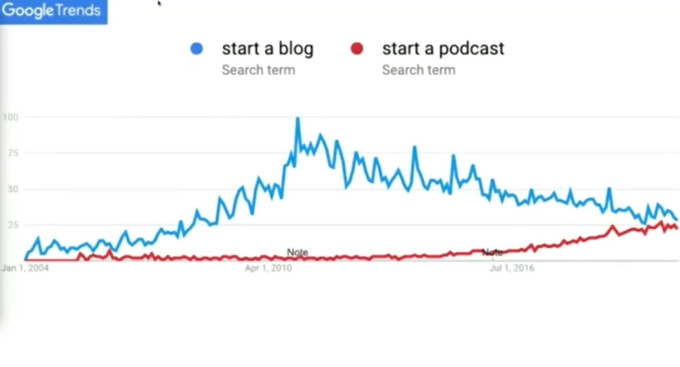
But what about podcast audiences?
Podcast audiences are growing, but the way we listen is changing too
That’s where Tom Webster of Edison Research comes in with his keynote from day one. According to his data, podcast listenership has been steadily rising in the US for the last five years. And audiences have upped their listening time per week by half an hour.
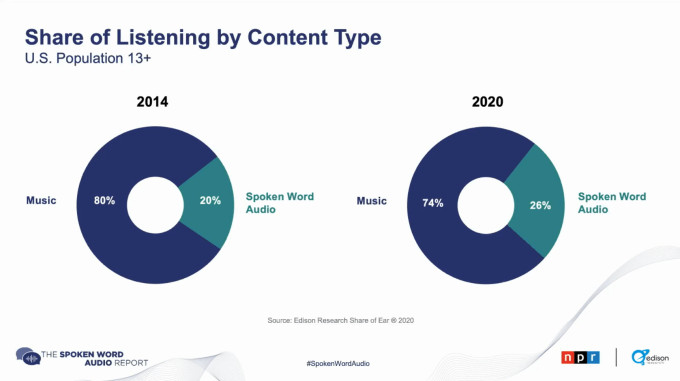
This podcast trend isn’t unique to the US either.
More people are listening to podcasts internationally
From the International Emerging Markets in Podcasting keynote, we found out that the medium is becoming increasingly popular around the world. Europe’s listenership is increasing (41% of Spain listens to podcasts), large growth is occurring in Asia, and there’s been an uptake in podcasts in English speaking African countries too.
Webster’s research also revealed that listening habits are changing.
People are listening to podcasts together
He found that 58% of podcast listeners in the US are streaming shows to listen to with someone else. There is now a want for connection, not intimacy, from the experience.
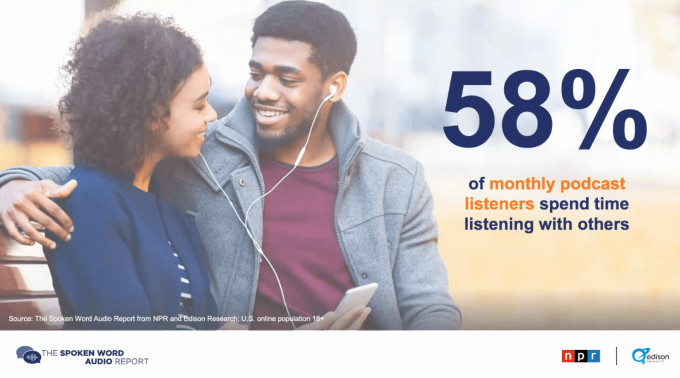
So more shows are being produced and more people are listening. But something else is happening too - more money is flowing into podcasting.
Big investment in podcasts
According to day 2’s Live Conversation with Mark Cuban, the podcast industry has now reached a ‘maturity’ where it’s proven itself to be a stable medium, unlikely to be going anywhere soon. That’s why you’re now seeing huge investments like Spotify’s $100 million deal with Joe Rogan and their $230 million deal with Gimlet Media.
Pat Flynn’s Podcast Growth echoes this, citing another huge purchase - Sirius XM’s $325 million acquisition of stitcher.
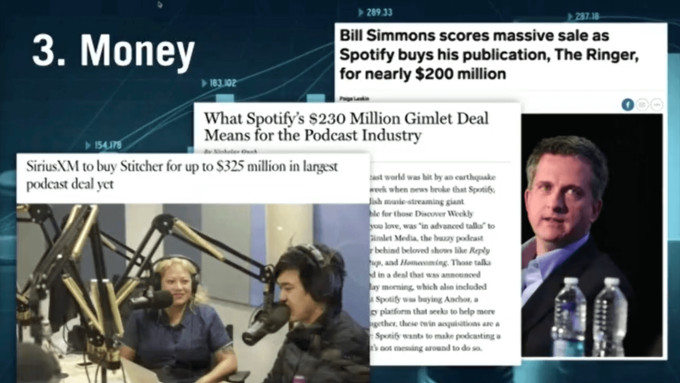
And the growth isn’t just due to big players investing heavily. Changes are happening at a grassroots level too.
The technology is becoming more and more accessible
A lot more people are making podcasts now due to them becoming much simpler to create. You don’t need specialist podcast equipment and a studio anymore - now you can bring together a basic show with a cheap mic and a laptop.
The technology needed to produce good audio is always improving, and with competition increasing, it’s getting cheaper too. The result is more people being able to piece together their own shows.
You don't even need to be in the same room as your co-host or guest anymore. Check out our article on how to record podcasts remotely to find out how to produce a show from the comfort of your own home.
With such rapid growth, it can feel like making your own podcast is a ship that’s already sailed. So how can you stand out in such a saturated industry?
You need to compliment, not compete
With so many podcasts out there, you need to be creative. And this is echoed throughout the keynote presentations by Tom Webster, Mark Cuban, the entire panel of Rise of the Daily News Podcast (In an Election Year), Pat Flynn and Lillian Garcia.
Mark Cuban points to examples from the past of organisations that have had to get creative to adapt to their environment. ‘Look at Netflix’ the streaming service originally started out by mailing DVDs to peoples’ homes. But as streaming became more popular they moved to that platform ‘and now they have more subscribers than cable and satellite combined’.
But not everyone can revolutionize podcasting. So what can you do to be creative and remain visible?
Podcast differentiation
Well, one important thing to remember from Pat Flynn is that ‘most people subscribe to an average of seven podcasts’. This isn’t a zero-sum game so you shouldn’t be looking to compete with other podcasts in the same space, you should be looking to compliment them.
Instead of looking for ways to creatively crush competitors, you should look at the content you want to produce and work out how it’s different to the rest of the content already out there.
This is something Lillian Garcia addressed in her keynote talk. To avoid her podcast, Chasing Glory with Lillian Garcia, becoming just another wrestling show, she decided that she needed a clear vision to set herself apart, which she achieved by focusing on human interest pieces, rather than wrestling anecdotes.
The panel of Rise of the Daily News Podcast also had to get creative with their individual approaches to differentiate themselves from one another. Each one, as the title implies, provides daily episodes centred on current affairs. But the way they are all able to operate in the daily news sector comes down to how they market their shows.
Each podcast set out their vision so they could stand out in an already competitive market:
What Next - wanted to be a ‘news doula’ helping people understand the day’s events
Post Reports - Wanted to give the headlines as well as other interesting news
Today, Explained - wanted to deliver the news using whatever tools they had (interviews, songs, vox pops etc)
The Daily - wanted to help make sense of the moment through strong narratives and characters.
So you can be creative with how you market your podcast and you can be creative with your podcast content ideas. The important thing is, as Mark Cuban says, to ‘never stop innovating’, because ‘when you run with the elephants, there are the quick and the dead’.
You need to get to know your audience
So you’ve got your own show and a few listeners and clearly some people are interested. But why do you need to get an idea of who’s tuning in? Quite simply, getting to know your audience will help you to tailor and target your content, provide them with a connection to you and let you use one of the most powerful marketing tools in podcasting - your fans!
How to find out who’s listening
How do you find out who’s listening? For podcasters of all sizes, the answer is simple - ask them!
The benefit of having a smaller fan base is that you’re much more easily able to interact with your listeners directly. You can do this by encouraging participation (asking them to get in touch with questions or comments), asking them to leave reviews, or even having them guest on a show.
Whereas for larger audiences, it might take a bit more time to work it out. You can also ask listeners to get in touch, but you can use polls to find out specific information too.
Tailor your content
Knowing who is listening is critical when it comes to producing relevant content. This is because different audiences need to be catered for in different ways.
We won’t go into too much detail because every audience will have its own characteristics and needs and it’s those aspects that will affect:
How you market your podcast
The language you use
The style of your show
The methods and techniques you use
The topics you discuss
The guests you invite on
So engage with your listeners. Include a call to action at the end of each episode and ask them to email or leave a comment. Reach out through social media and host polls and find out who’s listening and why they like your show.
Audiences want connection
Another reason you need to engage with your listeners is that, especially now, people want to feel a connection to the shows they listen to and the hosts that present them.
Another piece of research by Tom Webster showed that some of the main reasons people listen to podcasts is to feel less isolated and lonely and more like a part of a community. And these habits, he explains, will likely carry on after the pandemic.
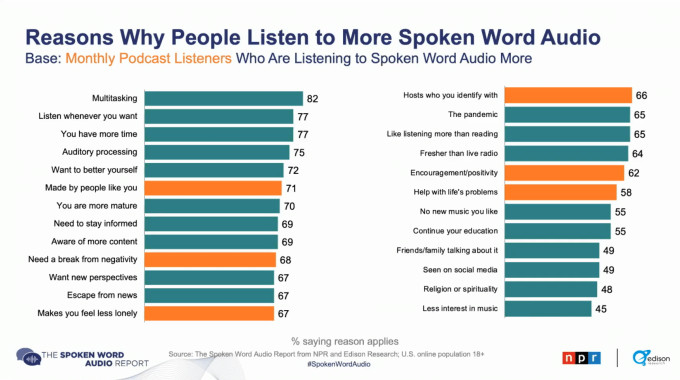
The research also showed that audiences now crave connection and engagement from their podcasts and that they now view it as a companion medium - literally keeping them company.
And big shows are recognising this.
Martine Powers of Post reports explained that they thought it was important to have a relationship with their listeners and to be seen to be hearing their audience. So rather than just doing more vox pops or having listeners leave a comment, they engaged directly with their listeners and asked their audience what sort of questions they wanted answers to.
Engaging listeners results in a more positive experience for them and this can result in a huge benefit for you as a producer.
Audiences are a great marketing tool
This piece of advice comes straight from Mark Cuban:
‘Your biggest fans are your best salespeople… Don’t be ashamed to ask them to recommend you to others.’
And who better to promote your podcast than someone who loves your content? So don’t be afraid to ask to be recommended in your call to action. Remember that people like to socialise with like minded people so let your listeners spread your brand throughout their network.
It might not sound like an effective way of promoting your brand, but (after searching the internet) recommendations provide the second largest source for new podcasts. This is true for both rookies (listeners who have been using podcasts regularly for less than three years) and veterans (listeners who have been using podcasts regularly for more than three years).
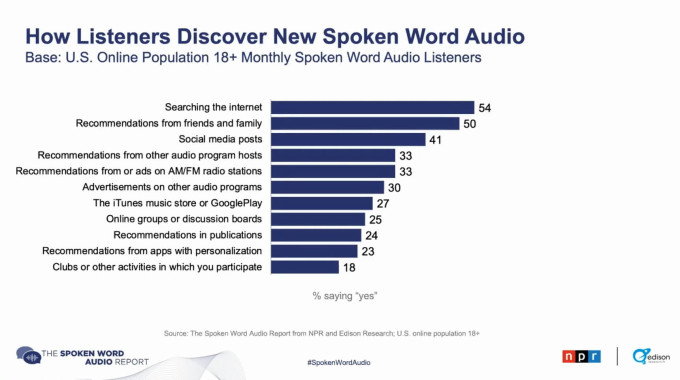
So, get to know your audience, tailor your content and connect with your listeners. Doing these things will help you to foster a strong relationship with them and allow you to grow your show organically, meaning you can look at other ways to market your show while still increasing listenership.
And, again, don’t be afraid to ask your audience to recommend you to their friends!
This is by no means the only way to market yourself though. For some other techniques on reaching new listeners, have a read of our piece on how to grow your podcast audience.
Wrapping up Podcast Movement Virtual 2020
They’re the top things we took away from PMV 2020
We’ve learned that there has never been a better time to get into podcasting now that more technology is becoming available and investment is being channelled into the medium.
We’ve found out that you shouldn’t be intimidated by competition because there’s plenty of opportunity to compliment existing content. Audiences are growing and the role audio is playing in their lives is changing.
And we’ve discovered why audience engagement is crucial in terms of keeping subscribers happy and growing your own listenership.
If you want to check out the talks for yourself (which we highly recommend) you can find the archived videos over at Teachable.
Thinking about launching a podcast for your brand?
If you need a hand launching, producing, or promoting your branded podcast, the Lower Street team is here to help. Get in touch for a free consultation.
Contact us




